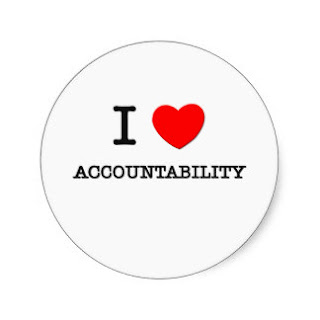In his 2002 business classic, The Five Dysfunction of a Team,
Patrick Lencioni describes "Avoidance of Accountability" as one of the
core behaviors that teams exhibit when they are dysfunctional. In Pat's
words: "In the context of teamwork...it refers specifically to the
[un]willingness of team members to call their peers on performance or
behaviors that might hurt the team."
Easier said then done. Many
teams (even ones where the members have excellent interpersonal
relationships) avoid accountability because of the possible discomfort
involved with having difficult conversations that may be emotionally
charged.
Recently, I discussed this topic with a friend who leads a
mid-sized manufacturing company that has multiple teams producing
products 24/7. He was wondering if there were any "leading indicators"
(or, data) that could predict team accountability. So far, our research
has concluded that there are none we could identify.
Accountability
is one of the main reasons executives hire a professional coach, and
shareholders/boards hire professional management to run teams. So, as a
coach (and when I was running the team at Princeton) here's what accountability looks like (simple example):
Coach/Manager--Will you do X?
Client/Employee--(Yes, No, Counter-offer). Yes. I'll do X.
Coach/Manager--When will you do it by?
Client/Employee--By close of business next Tuesday.
Coach/Manager--How will I know?
Client/Employee--I'll review it with you in our 1:1 next Wed. (I'll email you, I'll text you, I'll call you, etc.)
Next Tuesday 1:1 (or coaching session). Accountability at the top of the agenda:
Coach/Manager--So, how did it go with X?
Client/Employee--It's done (or, it's not done)
Coach/Manager--(If done) What was the result? (If not done) Why not? What do you intend to do now?
Client/Employee--This was the result. Or, X is no longer necessary because..... Or, I tried X and it failed, etc.
Coach/Manager--What did you learn? (always harvest the learning) What's next?
As
a manager, I did this weekly in the staff meeting (so as to create an
environment of trust and transparency). We always started the staff
meeting with accountability of action items from
the previous week. Also, it is possible for other members of the team
(not just the leader) to hold their teammates accountable
in the same manner. Especially when the action to be taken affects
someone else, or someone else's team. As a professional coach working
with fundraising leaders, I do this at the top of each coaching session
with clients.
To establish an environment of accountability,
it's important to do so without judgment or harsh criticism. That is
to say, the coach or the manager (or team mate) does not "judge" the
client, employee, or team mate as "bad", "stupid", "lazy", etc., if he
or she misses a deadline, chooses to change course (for good reason), or
fails in a task. Of course, should a pattern of missed
deadlines/commitments become apparent, then it is incumbent for a
manager to have a conversation around performance, and possible
dismissal. In the case of coaching clients, I may even dismiss the
client if he or she is not being serious about honoring his or her
commitments. I have done this on a rare occasion.

No comments:
Post a Comment